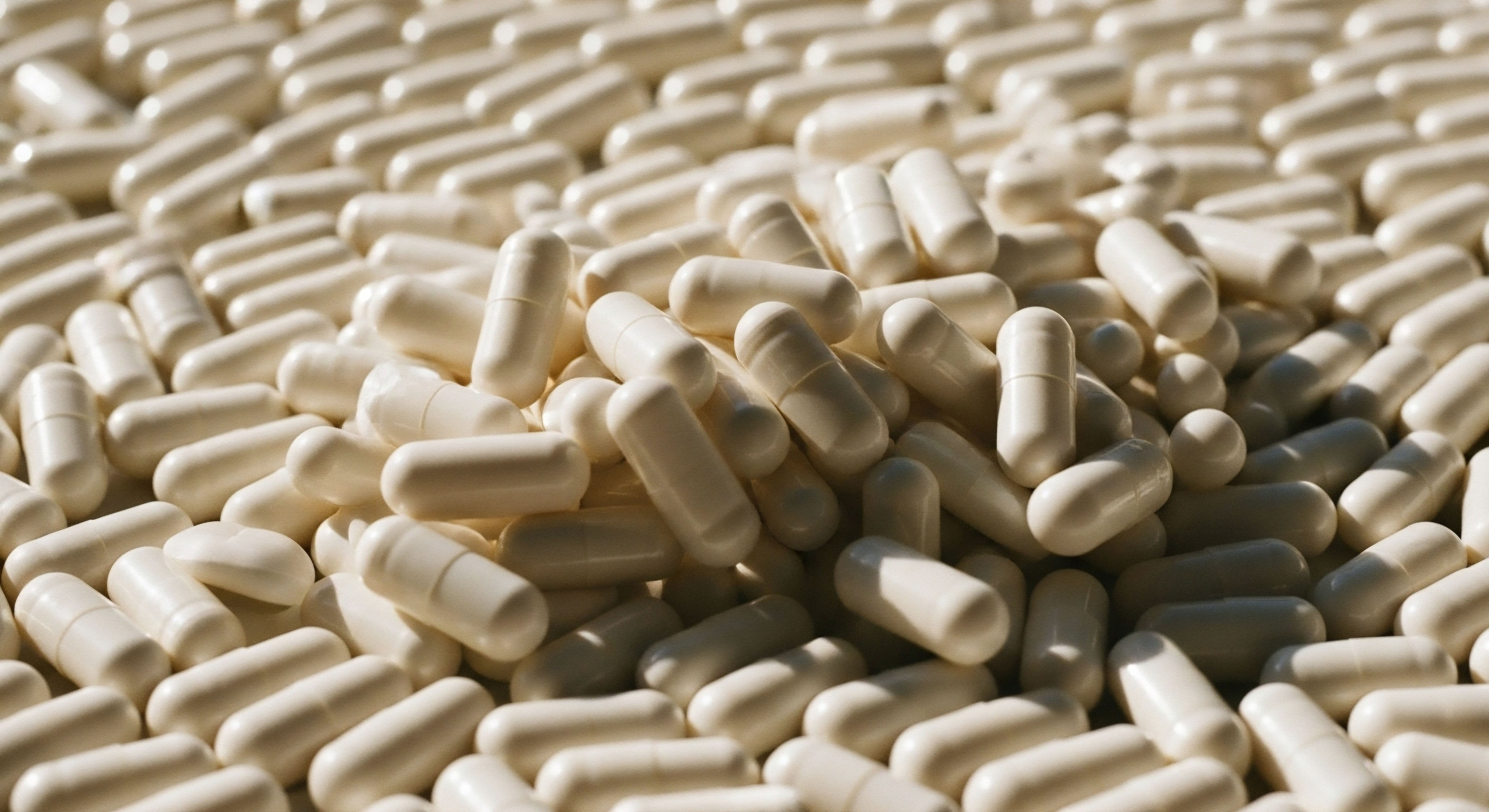

Fundamentals
You feel it before you can name it. A subtle shift in your cognitive landscape. The mental sharpness that once defined you seems to be losing its edge. Your energy reserves, once abundant, now feel perpetually low. These experiences are not isolated incidents; they are signals from a complex internal communication network, your endocrine system.
When we consider hormonal and peptide therapies to address these changes, we are initiating a conversation with our own biology. The question of whether lifestyle choices like diet and exercise can influence this conversation is a critical one. The answer is an emphatic yes. These factors are the foundational grammar of that biological dialogue, determining the clarity and impact of the therapeutic messages we introduce.
Hormones are the body’s chemical messengers, traveling through the bloodstream to tissues and organs, instructing them on what to do and when. They regulate everything from metabolism and growth to mood and cognitive function. Peptides, which are short chains of amino acids, act as more targeted messengers, often signaling for the release of other hormones or performing specific functions within cells.
When we introduce therapeutic hormones or peptides, we are augmenting these natural signals. Your body’s ability to receive and act on these signals is profoundly influenced by the environment you create through your daily habits. A body nourished with a proper diet and strengthened by regular exercise is a more receptive and efficient communication system.

The Cellular Environment and Its Impact
Imagine your cells as highly advanced communication hubs, each equipped with receptors that act as docking stations for hormones and peptides. The sensitivity and number of these receptors are not static. They are in a constant state of flux, influenced by your metabolic health.
A diet high in processed foods and sugar can lead to insulin resistance, a condition where cells become less responsive to the hormone insulin. This cellular deafness can extend to other hormonal signals, potentially dampening the effects of therapies like testosterone replacement. Conversely, a diet rich in whole foods, healthy fats, and lean proteins helps maintain cellular sensitivity, ensuring that the therapeutic signals are heard loud and clear.
Lifestyle choices create the biological backdrop against which all hormonal and peptide therapies must perform.
Exercise, particularly resistance training and high-intensity interval training, enhances this cellular receptivity. Physical activity increases blood flow, ensuring that therapeutic agents are efficiently delivered to their target tissues. It also improves insulin sensitivity and can stimulate the production of growth factors that support brain health.
When you engage in regular exercise, you are essentially upgrading your body’s entire communication infrastructure, making it more robust and responsive to the therapeutic interventions you are undertaking. This creates a synergistic effect, where the benefits of the therapy are amplified by the positive physiological changes induced by your lifestyle.


Intermediate
Understanding that lifestyle choices influence hormonal therapies is the first step. The next is to appreciate the specific mechanisms through which this influence is exerted. When a man undergoes Testosterone Replacement Therapy (TRT) or an individual uses growth hormone-releasing peptides like Sermorelin or Ipamorelin, the goal is to restore specific physiological functions.
Diet and exercise are not merely supportive players in this process; they are active participants that can determine the degree of success achieved. They directly impact the metabolic and endocrine pathways that these therapies are designed to modulate.
For instance, TRT is often initiated to counteract the effects of hypogonadism, which can include decreased muscle mass, low energy, and cognitive fogginess. Testosterone works by binding to androgen receptors in muscle, bone, and brain cells, initiating a cascade of events that lead to protein synthesis and other anabolic processes.
The efficacy of this process is heavily dependent on the individual’s metabolic state. A well-formulated diet provides the necessary building blocks for these processes to occur. Without adequate protein intake, for example, the body cannot fully capitalize on the muscle-building signals sent by the increased testosterone levels.

The Interplay of Diet and Hormonal Optimization
A strategic nutritional approach is essential for anyone on hormonal or peptide therapies. The composition of your diet can directly affect hormone synthesis, transport, and metabolism. Here are some key dietary considerations:
- Protein Intake ∞ Adequate protein is essential for muscle protein synthesis, a process that is significantly enhanced by TRT. Consuming sufficient high-quality protein provides the raw materials needed to build and repair muscle tissue.
- Healthy Fats ∞ Cholesterol is a precursor to all steroid hormones, including testosterone. A diet that includes healthy fats from sources like avocados, nuts, and olive oil supports the natural production of these hormones and provides essential fatty acids that are crucial for overall health.
- Micronutrients ∞ Certain vitamins and minerals play a critical role in hormonal health. Zinc is a key cofactor in testosterone production, while Vitamin D acts as a steroid hormone in the body. Magnesium is also involved in numerous enzymatic reactions that are important for hormone function.

Exercise as a Potentiator of Therapeutic Effects
The type of exercise you engage in can have a profound impact on the outcomes of hormonal and peptide therapies. Different forms of exercise elicit distinct physiological responses that can either complement or enhance the effects of these treatments.
Resistance training, such as weightlifting, is particularly effective at increasing the density of androgen receptors in muscle cells. This means that for a given level of testosterone, the body is better able to utilize it for muscle growth and repair.
High-intensity interval training (HIIT) has been shown to boost mitochondrial function and improve insulin sensitivity, creating a more favorable metabolic environment for hormonal therapies to work. Even moderate-intensity cardiovascular exercise can improve blood flow and reduce inflammation, both of which are beneficial for overall health and the efficacy of these treatments.
Strategic exercise protocols can amplify the cellular response to hormonal and peptide interventions.
The following table illustrates how different types of exercise can support specific goals of hormonal and peptide therapies:
| Exercise Modality | Primary Mechanism of Action | Relevance to Hormonal/Peptide Therapy |
|---|---|---|
| Resistance Training (e.g. Squats, Deadlifts) | Increases muscle protein synthesis and androgen receptor density. | Maximizes the muscle-building effects of TRT and growth hormone peptides. |
| High-Intensity Interval Training (HIIT) | Improves insulin sensitivity, mitochondrial function, and fat oxidation. | Enhances metabolic health, which is crucial for the optimal function of all hormones. |
| Steady-State Cardio (e.g. Jogging, Cycling) | Improves cardiovascular health, blood flow, and reduces systemic inflammation. | Ensures efficient delivery of therapeutic agents to target tissues and supports overall well-being. |


Academic
A sophisticated understanding of the interplay between lifestyle factors and hormonal therapies requires a deep dive into the molecular and physiological mechanisms that govern these interactions. The efficacy of interventions like TRT and peptide therapies is not solely determined by the dosage and frequency of administration.
It is profoundly influenced by the systemic environment, which is a direct reflection of an individual’s diet, exercise habits, and overall metabolic health. From an academic perspective, we can analyze these interactions through the lens of systems biology, recognizing that the endocrine, nervous, and immune systems are intricately connected and constantly communicating with one another.
One of the most critical areas where this interplay is evident is in the regulation of the Hypothalamic-Pituitary-Gonadal (HPG) axis. This complex feedback loop governs the production of testosterone in men and estrogen in women. While exogenous hormone administration can override certain aspects of this axis, its overall function and sensitivity are still influenced by lifestyle factors.
For example, chronic psychological stress, a sedentary lifestyle, and a poor diet can lead to dysregulation of the HPG axis, potentially making it more difficult to achieve optimal results with hormonal therapies. Conversely, a lifestyle that incorporates stress management techniques, regular exercise, and a nutrient-dense diet can help to maintain the integrity of this crucial regulatory system.

The Molecular Crossroads of Metabolism and Hormone Action
At the molecular level, the effects of diet and exercise on hormonal therapies can be traced to their influence on key signaling pathways. One such pathway is the mTOR (mammalian target of rapamycin) pathway, which is a central regulator of cell growth, proliferation, and survival.
Resistance exercise and adequate protein intake activate the mTOR pathway, leading to muscle protein synthesis. Testosterone also activates this pathway, and the combination of TRT and resistance training can lead to a synergistic activation of mTOR, resulting in greater gains in muscle mass than either intervention alone.
Another critical pathway is the AMP-activated protein kinase (AMPK) pathway. AMPK is often referred to as the body’s “master metabolic regulator.” It is activated by exercise and caloric restriction and plays a key role in improving insulin sensitivity and promoting fat oxidation.
By activating AMPK, exercise can help to counteract some of the potential negative metabolic consequences of high-dose hormone therapy and create a more favorable environment for the therapeutic effects to manifest. The following table provides a more detailed look at the molecular interactions between lifestyle factors and hormonal therapies:
| Molecular Pathway | Primary Activators | Interaction with Hormonal/Peptide Therapy |
|---|---|---|
| mTOR (mammalian target of rapamycin) | Resistance exercise, protein intake, growth factors, testosterone. | Synergistic activation with TRT and growth hormone peptides, leading to enhanced muscle protein synthesis. |
| AMPK (AMP-activated protein kinase) | Exercise, caloric restriction. | Improves insulin sensitivity and metabolic health, creating a more favorable environment for hormonal therapies. |
| Sirtuins | Caloric restriction, exercise, resveratrol. | Involved in cellular repair, mitochondrial biogenesis, and inflammation reduction, all of which support the actions of hormonal therapies. |

Neuroinflammation and the Role of Lifestyle
The brain is a highly metabolically active organ and is particularly sensitive to the effects of inflammation. Chronic, low-grade inflammation, often referred to as “inflammaging,” is a hallmark of the aging process and is associated with cognitive decline and an increased risk of neurodegenerative diseases. A poor diet and a sedentary lifestyle can contribute to systemic inflammation, which can then cross the blood-brain barrier and lead to neuroinflammation.
The brain’s receptivity to hormonal and peptide signals is directly modulated by the level of neuroinflammation.
Hormones like testosterone and estrogen have neuroprotective effects and can help to quell inflammation in the brain. However, their ability to do so can be compromised in an environment of chronic systemic inflammation.
A diet rich in anti-inflammatory foods, such as those high in omega-3 fatty acids, and regular exercise, which has been shown to have anti-inflammatory effects, can help to create a more favorable environment for these hormones to exert their beneficial effects on brain health. This is a critical consideration for anyone using hormonal or peptide therapies with the goal of improving cognitive function and overall well-being.
What are the long-term implications of combining lifestyle changes with hormonal therapies? A pilot randomized controlled trial published in Therapeutic Advances in Urology investigated this very question. The study found that combining a supervised exercise program with TRT not only improved symptoms of late-onset hypogonadism more effectively than TRT alone but also helped to maintain these improvements even after the cessation of therapy.
This suggests that lifestyle interventions can have a lasting impact on the body’s ability to regulate its own hormonal environment, making them an indispensable component of any long-term wellness strategy.

References
- North Dallas Wellness. “The Role of Diet and Exercise in Low Testosterone Treatment.” North Dallas Wellness, 12 July 2024.
- Hims. “The Role of Diet and Exercise in Testosterone Replacement Therapy (TRT).” Hims, 16 July 2025.
- Cho, Dae-Yeon, et al. “Exercise improves the effects of testosterone replacement therapy and the durability of response after cessation of treatment ∞ a pilot randomized controlled trial.” Therapeutic Advances in Urology, vol. 8, no. 4, 2016, pp. 257-65.
- Beyoung Health. “The Relationship Between TRT and Exercise.” Beyoung Health.
- Villareal, Dennis T. et al. “Testosterone Replacement Therapy Added to Intensive Lifestyle Intervention in Older Men With Obesity and Hypogonadism.” The Journal of Clinical Endocrinology & Metabolism, vol. 105, no. 1, 2020, pp. dgz035.

Reflection
The information presented here provides a framework for understanding the profound connection between your daily choices and the effectiveness of advanced therapeutic protocols. The journey toward hormonal balance and optimized brain health is a deeply personal one. The knowledge you have gained is a powerful tool, yet it is only the beginning.
The next step is to look inward and consider how these principles apply to your unique biology and life circumstances. What aspects of your diet and exercise habits could be refined to better support your wellness goals? How can you create a more receptive internal environment for the therapeutic signals you are introducing? This process of self-discovery and proactive engagement is the true path to reclaiming your vitality and achieving a state of sustained well-being.



